Music Reviews
...AND OTHER TALES - Rebecca De Winter
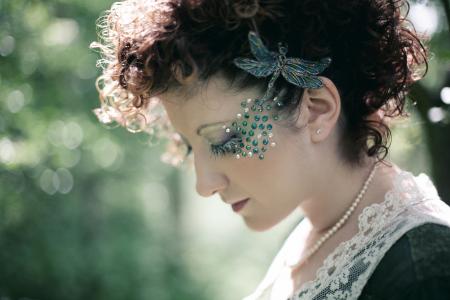
This was an evening of firsts - this was my first encounter with the works of Rebecca De Winter, and I must admit to liking it. It was also my first time at a musical evening at Scriveners - not top of my list of venues in Buxton, but I must admit to liking that too!
Accompanied by the able Dan on percussion and her sister Natalie on violin we were treated to an evening of mostly self-penned songs, beautifully played and sung. Themes of love and loss naturally appeared as they are the stock of most songs we know, but there was also hope and humour. Well I know it is a bit of a pain endlessly referring to other artists to describe the one reviewed, but in terms of that eternal question what do they sound like?, well I was thinking of early Tanita Tikaram at times or Julia Fordham.
I don't know about you but when it comes to covering a song, I sometimes shudder at the results, but we were treated to two remarkable covers of well-known numbers, including a 90's rave hit! Not at all out of place in the show, that's how remarkable it was. You can catch Ms De Winter on Youtube and Twitter if you want to hear/learn more.
So the trio are 'on song' and play well together - you may have seen them busking in town during the day! The venue proved to be up to the task and the audience really enjoyed the show and stayed to chat with the artistes. What more can you ask for?
Ian Parker Heath
12 STRINGS AND A DOUBLE REED - Bright String Trio with Alex Kane
This is the last of my Fringe Reviews and one wonders if the powers that be had left the best to the end. It was certainly a lovely evening's music in the perfect setting of the United Reform Church. There was an excellent programme provided with all the information the audience needed, and then on top of that Mary Dainton ('cello), Nicola Bright (violin), and Alex Kane (bassoon), took turns to tell us about each work as things went along. This is not only informative, but also brings the audience into the performers world and bridges any gap between audience and musicians - not that there is a gap with last nights players and audience; just friends enjoying the moment.
These experienced players began the evening with a trio by Hoffmeister (by the way, he wrote a very fine viola concerto!) which was a perfect opener for the evening. A delightful piece that showed the trio off with their excellent balance, ensemble, and intonation: 3 charming movements, especially the humorous last movement.
Mozart came next and Alex gave us an entertaining programme note on the work and then proceeded to play with the most beautiful bassoon tone I've heard for many a year. In spite of this work originally being written for oboe, this arrangement for bassoon made us all agree with Alex that Mozart should have written it for bassoon in the first place.
EJ Moeran completed the first half and what a discovery this proved to be. Two movements (can we have the third next time) of well developed music lovingly played, and the transition into the Presto in the last movement was masterful and felt so right.
After the interval we came to Martinu (a composer I have problems with) and the performance was very convincing. In the Andante Martinu uses his material cleverly, and we 're treated to the occasional delicious cadence. The Poco Allegro that followed was lively though serious, and the three part fugue-like contrapuntal sections were very well controlled. There was some superb viola playing from Mary Anderson, especially in the "Dvorak" section, and this all came to an excellent finish.
Alex then introduced us to Krommer's 1st Bassoon Quartet. The 1st movement was full of rhythm and life and had some speedy passage work for all the players executed brilliantly. The Adagio was super-controlled, poignant and sad, and the blend of two violas and bassoon was splendid; particularly obvious in the Minuetto and Trio. The bright and cheeky finale was tight, spirited and fast. The thematic link in all the movements added to the work's appeal. The perfect end to a perfect evening.
Andrew J Hodkinson
16 STRINGS AND A DOUBLE REED - Deconet String Quartet with Simon Beesley
It was good to welcome the Deconet Quartet back to the Fringe this year in the larger space of St Mary's church. They had brought with them Simon Beesley, oboe, which enabled them to include in their programme Finzi's Interlude for oboe and string Quartet. It is quite lovely music composed in the nineteen thirties when Finzis elegaic style had matured. There is always a tinge of sadness about Finzi's compositions and together, Deconet and Beesley, admirably caught the essential wistfulness of the work.
The programme had opened with Mozart's String Quartet in G K 387, one of the six so called Haydn Quartets. This is one of the composers more inventive compositions with a host of different ideas particularly in the first movement. It makes considerable demands upon all the players in the quartet and Deconet gave us a fine performance.
After the interval Simon played Britten's Six Metamorphoses after Ovid for solo oboe. Simon explained the narrative intention of each piece which was extremely helpful as there were no programme notes and without that explanation, as with almost all narrative music , it is difficult if not impossible to make out what story is being told. It was a carefully controlled performance requiring impressive breath control.
The programme concluded with the majestic String Quartet Opus 51 No1 by Brahms. As the leader explained, it was a composition which Brahms seemed to be writing for an orchestra rather than just a quartet. Certainly the outer movements are harmonically complex and a contrast to the more relaxed and lyrical inner movements. The beautiful romance was played with great sensitivity. Altogether a most polished recital.
Peter Low.
A SUMMER AFTERNOON WITH SEMPRE - Sempre
I caught the first of three half-hour sets from this Mansfield-based sextet - three completely different programmes were intended so I can't tell you what you might have heard in the other two!
Sempre are six women close harmony singers - they've been together for a while so you'd expect them to be pretty together by now, and so they are. The first programme was of familiar songs - which is always a mixed blessing. On the one hand it is good to hear songs that you know and love - but what if what you hear is a long way from your preferred account?
Anyway for me the opening take on 'When the saints' and 'Autumn Leaves' - as part of a 'four seasons' group worked especially well. That said it was a pleasure to be able to relax in an armchair at the piano lounge listening to Carol Clowes accompanying Sempre through 'We'll gather lilacs', 'Summertime', 'A Winter's tale', 'Till there was you' and, less familiar, John Rutter's 'Gaelic Blessing'.
This programme was completed by a reading of Pam Ayres' 'Forty shades of green' - you can see how that squeezed into the show!
Judging by the number of people hovering at the door of the lounge Sempre caught the ear of many passers by. I hope some of them stayed and paid for the later shows.
Keith Savage
ACAPELLA AND CAKE - Ordsall Singers
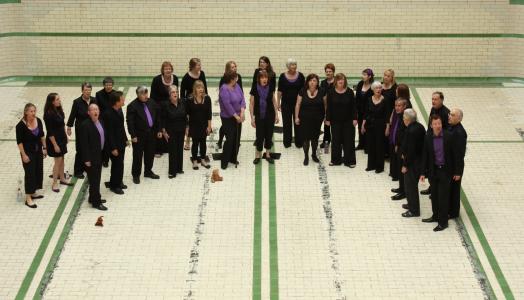
It was very warm and sunny this afternoon, the finest day for a long time. I entered the cool interior of St Mary's Church to review the Ordsall Acapella Singers (with cake to follow).
The Ordsall Acapella Singers, from Ordsall, Salford are a 32 strong troupe in four harmonies singing a capella (without instrumental sound) led by Jeff Borradaile. A group of people, mostly women, who clearly thoroughly enjoy their art and at times exceptional.
Their opening songs included a Ghanaian melody, 'Wasma Ajelile', a warm and relaxing introduction and set the mood. They sang 14 songs, in all, from Cole Porter to Marvin Hamlisch and many of the songs were favourites of the audience, some of whom clearly knew the singers from previous years' performances.
Not my cup of tea, but thoroughly enjoyed by the audience was 'Nellie the Elephant', 'Teddy Bears Picnic' and the song which was number one in the hit parade on the day this reviewer was born - 'How much is that doggie in the window?" I cringed a little as we were asked to stand for the audience participation song, 'The Grand Old Duke of York', sung in round, left side and right side. But it did make me smile in the end.
The mellow songs where the ones I enjoyed most, some quite beautiful, arranged with warm sympathetic harmonies and execution near perfect. I listened, entranced at times, lost in the moment. The centre piece, for me, was their rendition of John Lennon's 'Imagine', performed with a soloist. Although it was a standard arrangement it sent shivers down my back; so, so beautiful. (I did smile after the line "and no religion too." looking up at the crucifix hanging above the Apse.)
A very accomplished group of singers who are well directed. They deserve much acclaim. Thank you making a warm, sunny afternoon in Buxton, a memorable one.
Martin Wood
AN EVENING OF MILD AND BITTER - Sentimentalists

Sentimentalists are a part of the long tradition of storytelling in song. Their set could almost be
taken from a social worker's caseload as they deftly paint aural pictures of a series of lives blighted by despair, sadness, drugs, loneliness and giving up cigarettes. Don't get me wrong, it's not as gloomy as it sounds, as there is a strong sense of humour running through the set, and the band engage in witty banter with the audience and between themselves.
The secret to their stories lies it seems, in a tower block in Leeds where vocalist Phil Fowler's brother creates these scenes from the world he is familiar with. There are obvious parallels perhaps with other Northern observers of life's casualties such as Sheffield's Jarvis Cocker and Richard Hawley. Sentimentalists are a group of talented musicians and provide a good showcase for their songs is what you get. If you are in Buxton for their next shows in the Fringe, do get along to see them.
Ian Parker Heath
AN EVENING WITH AFRICA'S LADY OF SONG - African Soprano
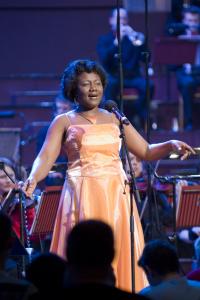
Apparently, Margaret Fergusson and Jonathan Ellis have worked together for 18 years and tonight was a celebration but for other reasons as well. It was a family affair. After the two encores there was an exchange of thank you and celebratory flowers and chocolate.
The lady from Ghana, accompanied by Jonathan Ellis, on the piano (who performed meticulously). Her soprano voice filled the space of the Methodist church with a varied mix of songs and arias from Mozart, Rossini, Britten and Hamlisch. Exquisite, bright and mellow and a touch of spice. My favourites of the evening were the 'Canzonetta Spagnuola' (Rossini) and 'Dreamers' (Adler/Hamlisch).
An evening with Africa's lady of song is one of a number of events where Festival audiences coincide with the Fringe. I find the difference intriguing.
It was a sweet night of song which heralded a change in the weather. All of which was much appreciated by the audience.
Martin Wood
CHAMBER MUSIC CONCERT - The Ryebank Trio

Three very talented musicians. They formed the trio ten years ago and as a result of playing together for so many years their ensemble is now marvellous. They play with complete confidence and assurance.
They opened their recital with Beethoven's C minor trio, opus 1/3. An early work but already Beethoven had begun to develop from his classical upbringing into the fiery romanticism that we associate with his compositions. Their delicate balance and careful observation of dynamics was enchanting and made for a delightful performance.
The trio then changed to a duo for two of Debussy's sonatas composed towards the end of his life at the start of the first world war as reaction to the German invasion of France. These are a complete contrast to the Beethoven being firmly impressionistic and with some strange harmonies. First was the violin sonata with some fine virtuosic playing from Duncan Reid. And then the more plaintive 'cello sonata with its technically challenging string part admirably handled by Douglas Badger.
The recital closed with Shostakovitch's B major trio. Quite why the Soviet authorities had objected to his compositions is now difficult for us to understand. This is without doubt a great work and Ryebank gave us a really memorable performance of it.
The mainstay in all of these works was Jonathan Ellis at the keyboard. His attractive playing seems to have become almost effortless which actually indicates his mastery of the instrument.
This recital was music making of a very high order. Buxton Fringe is indeed fortunate in attracting such fine musicians.
Peter Low.
CLUB ACOUSTIC - Local Singers and Musicians
Club Acoustic is a familiar group in Buxton, encouraging performance and listening to music with a folky, blues, jazz influence. Opening out one of their regular evenings to the Fringe is very welcome, and would have brought some new faces to the audience, as well as reminding those who haven't been for a number of years what a very pleasant way to spend an evening it is.
Local(ish) musicians step up to take their turn on the stage and play their 20-30minute set. There is a running order and a master of ceremonies to keep everything moving. However there's no formal programme so as it got later into the evening - and noisier, trying to catch the names of the different performers got increasingly difficult. So many apologies for not naming individuals.
It was a busy, popular event. We soon ran out of chairs and space in the main room (I shared my chair with a dashing vet!) There was a mix of people who very much wanted to listen, along with those happy to chat with the music more as background - encouraged no doubt by the fact they couldn't get into the main room. And maybe finding the balance between these groups was difficult at times as someone would come around and 'sssh' some of the talkers.
The music was a wonderful mix of mostly folk and blues, with some stretching towards a blue-grass sound. There were original compositions and re-workings of familiar songs. Instruments included guitar, banjo, fiddle, drum, harmonica and of course voice. A great feeling of musicians working together and supporting each other. The audience was encouraged to join in at times whether in singing along to The Hippopotamus Song (ie Mud, mud, glorious mud) or learning a chorus from a song that celebrated the paid working holiday "We're all going to the sea-side." Songs ranged from the comic to the thoughtful.
What comes through is the ability and talent of these performers, and their enjoyment of performing. Each act had their moment in the spotlight (lighting by 'Kevin') and each I would have been happy to spend longer listening to. At the beginning we had been thanked for coming to the early start and were promised we wouldn't want to leave. And that felt very true.
This may have been a one off Fringe event, but if you missed this get your self down to one of Club Acoustics' regular evenings - 2nd and 4th Wednesday, with a showcase event on the 5th Wednesday of the month.
Maria Carnegie
DERBY A CAPPELLA CHORUS - FOUR-PART HARMONY - Derby A Cappella Chorus
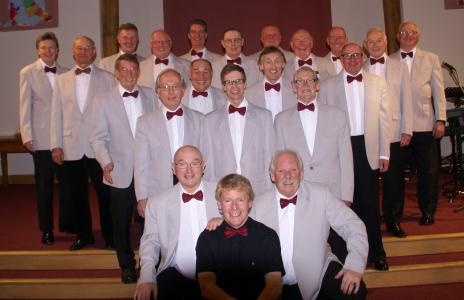
Being a singer myself, I was looking forward to hearing the Derby A Capella Chorus, but did not know quite what to expect. They are a 4-part barbershop chorus of around 15-20 men, all very much involved in performing to their audience, portraying every word by gesture and expression. It was hard to look anywhere except at the men, and scanning around, every one of them was fully engaged, and glued to their Choral Director, Andy.
The 'fellas' have quite a range of repertoire from 'Life is a Cabaret', to 'Ain't Misbehavin' to Buddy Holly numbers, Beatles, songs from Disney films, and even a barbershop version of 'Can You Hear the People Sing' from Les Mis. It really was a 'something for everyone' programme - and I found little to fault, and much to enjoy. Excellent diction, and a well-balanced blend made all the words discernible, and the harmony rich - a very good performance of 45 minutes straight, which I know from experience is quite a long stand for the men, so well done!
It was the Chorus' debut at the Fringe, playing in the Hydro Cafe, which makes a delightful informal venue for small/medium-sized groups. They are already planning to return next year and I for one am looking forward to it. Check out their website at www.derbyacapellachorus.co.uk.
Martin Bisknell
DIVA GIGS: A WEEK IN THE LIFE OF A DIVA - Sarah-Ann Cromwell
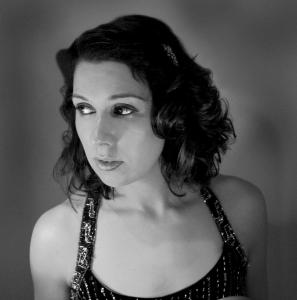
This afternoon (Friday) we were treated to an hour of song and chat from Sarah-Ann Cromwell, an established soprano, come down from the lofty heights of opera. "You don't have to be posh", she tells us, "to be an opera singer. In fact you don't even need to know any posh people".
Accompanied by a talented pianist, Sarah-Ann told us stories of her life interspersed with a selection of arias both classical and contemporary. In addition to her beautiful voice which accommodated the different styles of song she also treated us to a series of caricatures of personalities in her life and the characters within the stories of her songs.
Her goal is to give opera an 'ordinary' face and the audience acknowledged this when they laughed and chatted with her.
My favourite was the wordless voice piece, "Eliza Aria" from Wild Swans, recently made famous through a TV advert for a well known High Street bank. (It was interesting to discover its origin). I also enjoyed the three pieces by Liza Lehmann; quite enchanting. My least favourite was the closing song, 'tone deaf', but that was just me, I think, the rest of the audience chuckled through it.
Thank you, Sarah, for a chilled out afternoon; well worth the trek through the rain and thank you also for taking the risk to be personal with your audience: I came away feeling like I'd known you for years.
Martin Wood
HUMOUR IN HARMONY - Sheffield Lydian Ensemble
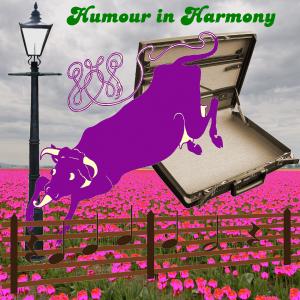
This event was largely the fault of John Kilpatrick and he'd admit to that. Sadly it may never be repeated - which means that most of this programme will never be heard again. This would be a great pity.
To be fair the idea behind this programme might appeal to what marketing people describe as a limited demographic. If you don't like Edward Lear or Flanders & Swann (or have not heard of them) then probably it wasn't for you. On the other hand if the idea of setting nonsense words to serious-sounding and solemn music tickles your fancy then you'll be kicking yourself for missing out.
A sung set of announcements - telling you where the toilets and fire exits were to be found set the tone. This was followed by a piece called 'My Briefcase' written by John Kilpatrick. In this he parodies some musical styles that he loves (you may recall he brought Monteverdi to Buxton two years ago and required that the event started at ten past four in the afternoon - you'll need to think 24-hour clocks here). John describes it as a 'spoof madrigal' - my favourite sections offers a discussion on the metrification of paper sizes ('What's wrong with Quarto? What's wrong with Foolscap?)
More familiar - lyrically at least - were three Lear limericks set by the Hungarian composer Matyas Seiber. 'There was an old person of Cromer' worked especially well - the music making you think more about the words than you are inclined to do when reading them.
Then followed settings of four very different lyrics by George Nicholson who was present to play piano accompanying soprano Jane Ginsborg. Now I can't sing 'Happy birthday' nor play 'Chopsticks' but I'm pretty sure this was technically demanding stuff - why, some might say, go to the bother if the words are just a joke? Taking this all seriously was part of the joke, of course, and sorry if it doesn't appeal to you.
Peter Taylor's fine baritone voice gave us three Flanders & Swann classics and it was a treat to hear the whole audience join with the chorus of 'The Hippopotamus'.
The final piece was another John Kilpatrick composition - setting nonsense lyrics by the Bostonian Frank Gelett Burgess - who if you know him at all it will be for:
'I never saw a purple cow/I never hope to see one/But I can tell you anyhow/I'd rather see than be one!' The ballad of the purple cow itself was told in cod-Chaucerian English.
A 16-strong choir plus 5 wind-players delivered the programme with total commitment, delight and enthusiasm. Informative and witty programme notes will be a treasured memento of a perfect entertainment for a Saturday afternoon. Many thanks to everyone involved.
Keith Savage
KISS OF THE RED MENACE: A TRIBUTE TO KANDER & EBB - Ladyblue Music
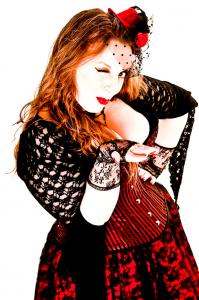
Mention the names John Kander & Fred Ebb to many people, and it's my guess you'd bet a blank look in return. Tell those same people that Kander & Ebb were the musical masterminds behind such shows as Chicago and Cabaret, and the recognition would begin to dawn.
Kander & Ebb's exceptional skills took musical theatre into a new direction, their characters inhabiting a world where bleak reality and glamorous show business collide - whether it's the sinister decadence of a Berlin nightclub mirroring the rise of Nazism in Cabaret, the vaudeville song 'n' dance numbers providing an escape for the women on trial for murder in Chicago, or the sumptuously cinematic fantasies of the imprisoned gay window dresser in Kiss of the Spider Woman. Kander & Ebb's characters are often damaged individuals, whose songs are a brittle mask of the heartbreak within.
It is into this world that Miss Melody La Rouge takes her audience in her masterful one-woman show, Kiss of the Red Menace. Miss La Rouge, a big-haired, burlesque-style belter takes the audience through the career of Kander & Ebb, cramming into an hour 14 of their greatest songs. Clad in red and black, she flirts with the audience, purring 'thank you' between each song, in a mid-Atlantic tone that sometimes has resonances of Kander & Ebb's muse, Liza Minnelli. Her links are informative and amusing, and the show moves seamlessly from one song to the next. And, like Kander & Ebb's work, her larger-than-life, 'life is a cabaret' style occasionally allows the audience of a vulnerability beneath the surface. She is equally assured on the belt numbers, such as When You're Good to Mama, as she is on the more introverted songs, such as Isn't This Better (a new one on me).
If you like musical theatre, and know the work of Kander & Ebb, you'll love this show. Even if it's a new world to you, come and see this assured, highly professional and very enjoyable one-woman show. It's worth it just for Miss La Rouge's rendition of the title song of Kiss of the Spider Woman - dripping in all the seductive menace that these two masters of musical theatre intended.
Robbie Carnegie
LILI LA SCALA: SONGS TO MAKE YOU SMILE - Lee Martin for Gag Reflex Management

Any singer who headlines her show with the title 'Songs To Make You Smile' could be asking for trouble. What if the songs don't make the audience smile?
There are no worries on that score in this delightful show. Lili La Scala is an absolute delight, her diction like cut-glass crystal, her high soprano voice like a bell. She is a character from another age, conveying her love of songs from the first half of the 20th Century to a bewitched audience. She is a woman on a mission - to track down lost or forgotten sheet music of once popular songs and bring them to a modern audience. And she has that old-fashioned and indefinable quality - glamour.
It is a short show, but beautifully proportioned, with a programme including works from Cole Porter, Ivor Novello, George Formby and Gracie Fields. Accompanied with style and humour by her faithful pianist, Dickie, Lili - a vision in a little black number and extraordinary shoes - flirts and jokes with the audience. The whole thing is utterly enchanting and she holds the audience spellbound, even managing to warmly encourage a bit of good-natured audience participation (I don't think I'll ever live down the Tarzan call she coaxed out of me!).
Lili is performing at the Arts Centre Studio for a further two nights - do try and catch this adorable show if you can. It'll leave you with a warm glow in this cold, damp summer.
Robbie Carnegie
MONK LIVES! - The Exchange Orchestra
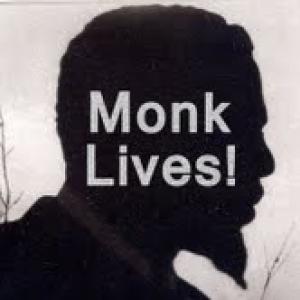
Thelonious Monk died 30 years ago - before any of the five musicians in the Leeds-based Exchange Orchestra were born. Much of the music for which he is best remembered was written and recorded nearer 60 years ago. So what is the enduring fascination with Monk based on?
I remember writing at the time of his death that there was no piano player that I would rather listen to than Monk; listening to the Exchange Orchestra I was reminded that there is no corpus of work that I would rather keep than Monk's. Over a performing career of around 30 years Monk wrote 70 or so tunes and his reputation today is based on barely 20 pieces that have entered the standard jazz repertoire - but how musicians love those pieces!
Monk's written is often spare, witty, moving and always memorable. The Exchange's Norwegian guitarist Eirik Svela explains - "Unlike some pianists, such as Bill Evans who uses massive chords, Monk's music is often based on chords of two or three notes. There is space in his music and as a guitar player I feel that I can play his music". Given Monk's totally individual approach to the piano it isn't a bad idea to have a piano-less group to interpret his music - it saves the comparison.
The Exchange Orchestra (Matt Anderson and Ben Loman - tenor saxes; John Anderson - drums; Emlyn Vaughan - bass guitar; Eirik Svela - guitar) is modelled on the sextet put together by Paul Motian in the late 90s to record music by Monk and Bud Powell. Motian had a second guitarist in his band - the Exchange's second guitarist is currently in Sweden.
Like the Motian band the Exchange Orchestra approaches Monk's music with respect. They play with restraint and purpose; solos are patiently and careful constructed and crafted. The saxes of Anderson and Loman are distinctive and wisely they seem to draw on Charlie Rouse's version of Monk (rather than, say, the more enigmatic work of Coltrane or Rollins). Svela's guitar is clean and the rhythm section is never obtrusive but prodding, prompting and pushing.
The Orchestra played eight Monk compositions - avoiding 'Round Midnight because as Eirik explains "it has too many associations. But we will play it." The highlights included the blues Misterioso, with a sax duet and typically thoughtful drum solo, and the ballad Reflections. Little Rootie Tootie and Bemsha Swing were among the jauntier tunes. I look forward to hearing Ruby, My Dear some time.
Five may be a small number for an Orchestra but the name emphasises that this is ensemble playing of a very high order; there are no egos pushing for attention here.
There are always some shows early in the Fringe that deserve big audiences but miss out. This was one of those. As the person sitting next to me observed: "If I hear anything better all Fringe I'll eat my umbrella".
Keith Savage
MORE PIECES FOR EIGHT - Sovereign Saxophone Octet
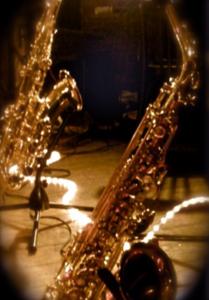
For those unfortunate people who were not at this concert, then you missed a treat. This group never fail to entertain with a mix of music and periods and always offered with great professionalism, and enthusiasm. Tonight was no exception.
From the opening piece "African Waltz", to the Jazz Standard at the end "The Sheik of Araby", the audience were wowed, and in between were some truly amazing sounds and pieces all delivered with panache and style. This versatile group of eight players include some very gifted arrangers, each with their own "voice" and "take" on the ensemble and it's possibilities.
The programme had such variety and style changes that there was no knowing what a saxophone could play. A group that can turn it's hand to Gabrieli, Debussy, Delibes and Jelly Roll Morton, Shostakovich and Ted Snyder is clearly a group to take notice of. Most ensembles often require three sticks to hold them together; one at the front (conductor) and a pair at the back (drummer), but this team more than managed without either.
The ensemble was tight, and the intonation pretty nearly faultless, with a blend of colours and dynamics that couldn't fail to please. Apart from the Gabrieli which I just adored, the high points for me were Crucificus by Antonio Lotti, a 17th century composer whose use of suspensions was mind-blowing, and Shostakovich's take on "Tea for Two" in the guise of "Tahiti Trot" very ably arranged by Gordon Robson.
Quite brilliant!
Andrew J Hodkinson
MUSIC CONCERT - Grasp The Nettle
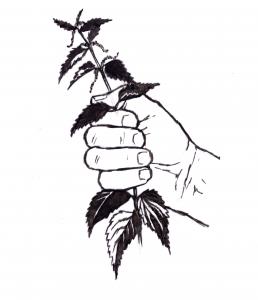
It was a full-house with standing room only at The Railway as people gathered for a concert of Irish music held to remember local fiddle player Sean Healey who died a year ago. Sean was a real larger than life character who touched the lives of many people in the High Peak over many years.
Fittingly a good number of the tunes and songs were ones that Sean had either written or played. Even though Joe McGill is one of my son's best friends I didn't know that Sean wrote 'Joe McGill's Jig' to mark his birthday 31 years ago. So hearing that was a delight. I've also got pleasure from seeing the Whaley Bridge dance outfit Clever Clogs over the years - so it was fun to hear some of the tunes Sean played for them.
Other tunes written by Sean included 'The Life of Riley', for local allotment holder, electrician and accordion-player Dave Riley. Near the end of the evening Alex McGill sang a song that he said 'always reminded him of Sean - The Parting Glass.'
But it wasn't all about Sean - though you felt he'd have loved every minute of it. Two original songs by Andy Wedderburn caught the ear. One was a version of the old song 'McNamara's Band' - now 'McNamara's Bank'. Given the fond esteem in which banks and bankers are held you could probably write a verse or two of your own. There was also the moving 'The Western Wind' in which those left behind imagine they can still hear the voices of migrants who have left.
Terry O'Malley shared some of the singing duties and led a crowd-pleasing version of 'Whisky in the Jar'. The band was completed by fiddle-player Tim Newton whose work in many of the jigs, reels, slides and polkas gave energy and force to the music.
This was very much an evening of music as a social event - as friends gathered to meet and to sing. However our thanks are due to Grasp the Nettle for putting together an impressive programme of 30 or so pieces - mostly Irish in one way or another - to make the event possible. This was only their second public performance. The reception they got should ensure that there are many more to come.
Keith Savage
MUSIC FOR STRINGS - Amaretti Chamber Orchestra
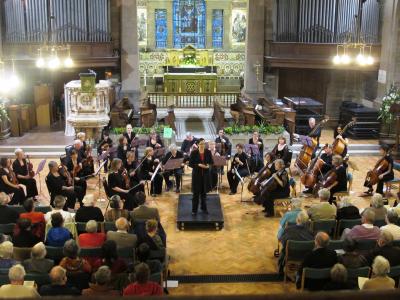
The concert given by the Amaretti is always a notable event during the Fringe. This year they brought their guest conductor Juan Ortuno and a programme of mainly English music. There being no programme notes the conductor introduced each work with a careful and engaging explanation, occasionally including illustrative excerpts played by the leader. This was most welcome.
The concert opened with a symphony in A major by CPE Bach. Although the son of JSB had been thought the more significant composer during his life time he is now largely forgotten. He composed an enormous quantity of music of surprising inventiveness and this symphony prompted a strong desire to find out more about his music. Bach was followed by George Dyson's Concerto da Chiesa. This is a difficult piece which perhaps explains why it is rarely performed which is a shame. It is very lyrical and very much in the English tradition and based on familiar English melodies such as the advent hymn O come Emmanuel and popular carols.
After the interval the orchestra played a new work by Paul Lewis entitled English Suite for String Orchestra. It was said to reflect the composer's love of the English countryside. But this rousing work is much jollier than the washed out landscape we have been enjoying recently. Then Elgar's elegy opus 58. This is music which really suits the Amaretti and they played it superbly. Written by Elgar in memory of his friend Jaeger (Nimrod in the Enigma Variations) we were encouraged by the conductor to think, while they played, of someone recently lost; it was a most moving performance.
Finally the orchestra gave us the well known Fantasia on a theme by Thomas Tallis by Vaughan Williams. Dividing the orchestra and putting half in St John's sanctuary, while the rest were in the nave, worked well and effectively re-created the sound that RVW intended.
We are very fortunate on the Fringe to attract such fine musicians as the Amaretti. Long may they continue coming to Buxton.
Peter Low.
MUSIC OF THE HEART - Selfmade Music
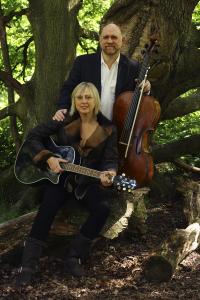
If you were not at this recital, and I'm pretty sure you were not, then a) you missed a rare musical treat, and b) you have a chance to catch the recital again this Sunday at 2pm at the same venue. I really urge you to go.
Michael began the recital with Bach's Adagio giving us a chance to hear his superb 'cello playing - rich and expressive and suitably plaintive. Susie then moved from the piano so that Michael could accompany her in Bach/Gounod "Ave Maria". What an amazing voice which just gets better and better. There followed music by Mozart, and Morricone. But the next two pieces were something else. Not so much romance, but seduction on a grand scale - Bizet's "Carmen" of course. Emotion such as this is rarely if ever heard in a church, let alone a Methodist one; an excellent rendition of the Habanera, and Sequidilla! Such body language and facial expressions!
Things calmed down a little for Massenet - Melodie-Elegie, and Ravel - Pavane showing just what wonderful bow control Michael has on his 'cello. Saint-Seans followed, with the aria from Delila and then the Swan, each taking turns to be soloist and accompanist. Each of the performers are also composers and we were treated to a work from each, showing what multi-talented musicians they both are.
The recital finished with two Gershwin pieces, "Love is here to stay", and "A foggy day in London town" which were deliciously sung by Susie accompanying herself on the piano and letting Michael weave counter melodies on the cello - a joy to listen to. You must go on Sunday to experience this delightful hour of music.
Andrew J Hodkinson
MUSICALITY! - MusiKa
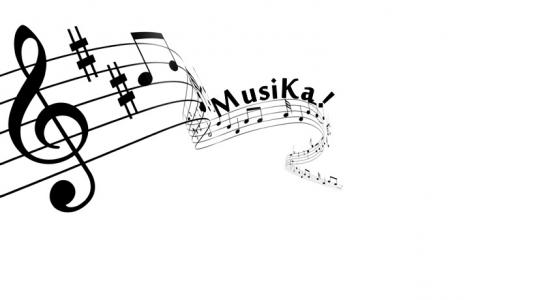
I can't remember the last time I saw a 'Songs from the Shows' concert at the Buxton Fringe, so how refreshing to see Liverpool trio Musika bring a selection of hits from the musicals to the United Reformed Church.
The three performers, Rachel Ashton, Kevin Foott and Helen Griffiths, brought a programme of very familiar favourites to Buxton, accompanied by pianist Roger Stephens: All That Jazz, As Long As He Needs Me, Beauty & The Beast ... the list goes on.
Performing in a church, without the shield of clever lighting is very exposing, but the singers rose to the challenge, with simple but effective staging. All three have deep voices, so some of the songs were better suited to their voices than others: Another Suitcase In Another Hall, I Know Him So Well and (well sung by Ms Ashton) The Music of the Night. Occasionally, in transposing some of the other songs into a key that was comfortable to the singers, some of the musical nuances were a little lost.
In what was a short programme, I perhaps would have chosen to have only one song from any one musical, just for variety's sake, but what was there was a repertoire of crowd-pleasers. Perhaps a touch more polish on the links between the songs would also have given an extra lift.
One final thing: I was tempted to say that an interval seemed a bit unnecessary in an hour-long show, but then the singers provided the audience with home-made cake, so I'll let them off!
Robbie Carnegie
ORCHESTRA CONCERT - High Peak Orchestra
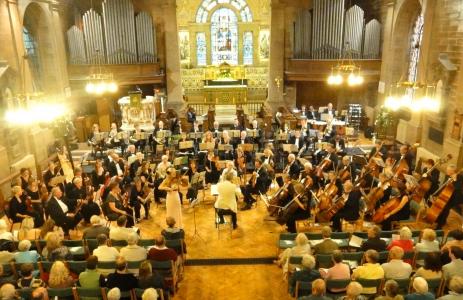
I am by no means fit to comment on the technical content of this concert played in the awe inspiring space of Saint John's Church with its marvellous acoustics. I am, however, fully qualified to comment on how enjoyable it was - tea, biscuits and all!
This very well attended event for an evening of top quality performance was conducted by the ever incontrovertible majesty of Andrew Hodkinson.
We began with the rousing alarms of Beethoven's Fidelio Overture Opus 72b and then moved into the familiar openings of Mozart's Symphony No. 40 in G Major. The second half, post tea and biscuits, was filled with Brahm's Piano Concerto No. 2 in B flat. For the Brahms piece the audience and orchestra welcomed the soloist Benjamin Powell who proceeded to produce a performance of the highest quality and demonstrated what a talented player he is - brilliant and intelligent piano.
The High Peak Orchestra excelled throughout the evening and maintained a professional level of quality throughout, with some especially beautiful moments in the Brahms where the cello took centre stage.
I must personally congratulate myself on my self control to not embarrass myself and burst into applause (again) whenever the music stopped...or paused, I'm not sure which and still am not completely sure.
This was an evening of quality that adds yet another dimension to the fringe programme and shows just how talented our local musicians are.
High Peak Orchestra next perform on Saturday 17th November in the Buxton Methodist Church at 7.30pm where they will play pieces by Vaughan Williams, Brahms and Mendelssohn.
Paul Harrison 15th July 2012
PARTITA - EARLY MUSIC CONCERTS - Partita

If one arrives a little early for events it is often a joy for audiences to hear the last minute preparations like tuning, and today was a treat for me. When 'early music' instruments have so many strings I never cease to be amazed at the task that has to be achieved, but achieved it was with panache.
Thomas Campian was our first treat, and we were given a beautiful rendition of "When to her lute Corinna sings". Sasha Johnson Manning sang with clear enthusiasm and love of the music, and the instrumental accompaniment was just wonderful.
I could go into detail about each of the 15 pieces in the programme, but they were all so good, and the performers were all so committed to their music, that I am unable to pick out one piece as a favourite.
All the performers were so professional and enthused that it was a delight to be involved as listeners. Introductions to the various composers from the gifted and versatile Roger Child were both informative and humorous.
If you were unable to attend this concert then I must urge you to attend the next performance this coming Monday in St John's parish Church. If, like me, you are not greatly familiar with early music, don't let that put you off - this a jewel of a concert.
Andrew J Hodkinson
PIANO RECITAL: MUSICAL JOURNEYS - Jonathan Ellis
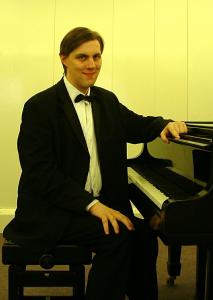
Jonathan Ellis' Piano Recital on the final night was the icing on the cake for me. The audience of 32 heard an exceptionally high standard of piano playing by Jonathan Ellis. He took us on a beautiful and emotional journey as well as showing great technical mastery in a programme which consisted of many very difficult pieces.
Jonathan had a good rapport with the audience explaining significant background information about the music which enhanced the enjoyment. It was so informally undertaken that a member of the audience asked him a question about a composer. The communication with the audience was continued when he gave the occasional glance as if to emphasize that this was an important moment in the piece.
The theme behind the whole concert was that of a journey. In the French Suite no.6 in E major by Bach, each of the dances which it comprised of came from different countries in Europe hence we were hopping around Europe. The Allemande, for example, is a German Dance and the Gigue is a British Dance. The second piece was Debussy's Estampes and in this we travelled to Java, Spain and to Debussy's homeland France. The third item involves two pieces from the Liszt's Années de Pélerinage which were originally in the Album d'un Voyager which was largely written in Switzerland. After the break we were taken on a quick trip from Vienna to London in the last of Haydn's Sonatas and finally we travelled on perhaps both a physical and emotional journey in Schubert's Wanderer Fantasy.
I don't think it would be a great surprise to anybody that Liszt is Jonathan's favourite composer because he is so good at playing it. However we heard in the Debussy promises of things to come in his breathtaking climaxes and his ability to bring out the melody line. In the second of the Liszt pieces he empathised so closely with the composer that we were saddened by the melancholy and longing which Liszt experienced in his turbulent life. In the Haydn Sonata he played it in my opinion as if it was a piece by Beethoven, very stridently with big contrasts in dynamics. This was a brave approach which the audience appreciated. Jonathan showed that he was up to playing the most technically difficult of Schubert's piano music with its presto section and semi -demi -semi quaver passages. Just as Jonathan demonstrated to us the musical relationship between Haydn and Beethoven he showed us a similar relationship between Schubert and Liszt by his performance. Schubert was anticipating Liszt in this work by theme transformation and telescoping the separate movements into a single structure without any breaks. He played it perhaps more like how Liszt would have played it than Schubert would have done even if Schubert had the technical ability to do so.
The audience demanded an encore and we were treated to Scriabin's etude op 8 no.12, a Horowitz favourite and one of Liszt's Donizetti opera transcriptions.
This was a performance to remember.
Roger Horvath
PICTURES IN MUSIC - James Pelham
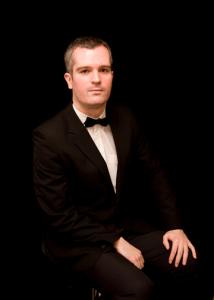
James is well known and well established in the North-west's music making world - as a conductor, musical director, solo pianist and accompanist and it is a pleasure indeed to have him back on the Fringe in 2012.
His solo programme for this year was demanding both on him and the piano at the Methodist Church. He chose to call this recital Pictures in Music and the detailed programme notes that he provided gave very clear ideas of the pictures he had in mind.
In some cases, of course, the composers point us in the right direction. Chopin's 'Raindrop Prelude' began with the sort of 'rain' that you might raise your head to and almost welcome as it splashed your face. In time much more insistent and hurtful rainfall would cause you to look down and hurry on.
In other instances the titles are not the composer's own. So two movements from sonata by Beethoven - the Moonlight and the Tempest - owe their evocative titles to others.
Not every piece described something so tangible or visual; Mussorgsky's 'Meditation', for example, encouraged us to imagine how contemplation might lead to confidence in self and action. One movement from the same composer's 'Pictures at an Exhibition' - in this case 'The Old Castle' - was for me one of the highlights of the evening and Mussorgsky's work (there were two further pieces) perhaps brought out the best in James' playing and interpretation.
The programme offered a full range of emotions - from the opening Rachmaninoff 'Polichinelle' full of Romantic passion and intensity - to the much quieter reflection of Ravel's 'Pavane' for a dead princess. It is evident that James wants to communicate through his music making and his formidable technique is there to aid that expression.
James received a well-deserved standing ovation for a programme that was always accessible and enjoyable. He can be sure of a warm welcome in 2013!
Keith Savage
ROARING OWLS - Karen Heywood & Liz Turner
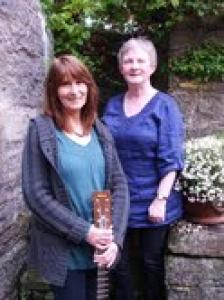
From the 16th Century through the 18th to the 1980s, Liz Turner and Karen Heywood told stories of love, betrayal, merry making, sadness, war and loss through traditional folk harmonies.
Their selection of 16 songs, many of which are Scottish, created images of people, their environments and their relationships with colour, humour, (bawdiness) and sadness. Their enthusiasm is contagious and was thoroughly enjoyed by the audience.
We were encouraged to participate in most of the songs by singing the refrains and many of the songs had foot tapping rhythms. In a more open space we would have been on our feet.
We live in a world of instant information access and where a capella has diminishing audiences but the dedication of Karen and Liz to their art form is a credit to them. They keep alive the tradition of story telling, remembered through song, which helps new generations retain images of their predecessors.
Thank you for doing what you do.
Martin Wood
SEX, DARKNESS, FEAR - The Tallyman's Dark Omnibus
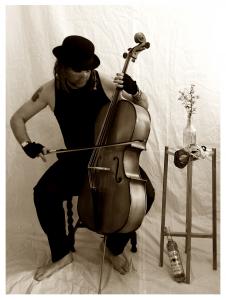
So, The Tallyman's Dark Omnibus returns to The Fringe with his witness statement to life in the early 21st century; and what a statement. Full of abuse, death, tragedy and more, we have to wonder where this world is at times. There are references to the Walsall, Sicily and London suggesting a well-travelled songsmith, or at least one who sees doom-laden despondency as a global phenomenon. Given this, it is not surprising to learn that the tone and style of the show is unremittingly gothic. Less Nick Cave, more Swiss/German duo Lacrimosa, with sweeping sound and spoken word creating for some an uncomfortable picture.
If you caught The Tallyman's Dark Omnibus shows at The Fringe in 2010 you would be familiar with much of the setlist, and if you liked that, you won't be disappointed this year. If you didn't, you can catch some performances on the web (http://www.myspace.com/thetallymansdarkomnibus)
Ian Parker Heath
SONGS FOR ALL SEASONS - Local Vocals
Led by the effervescent Carol Bowns with help from her accompanist husband, Ian, this enjoyable evening invited the audience to forget any inhibitions and join Buxton's community choir for some friendly singing of everything from Polynesian calling songs to Glenn Miller's In the Mood and a much-abbreviated version of The Hallelujah Chorus.
The Seasons theme was duly observed as we cuckoo-ed round the room in a round, decided we were 'all going on a summer holiday' and enjoyed the quiet melancholy of 'What lies within a seed?' Thanks to the confidence of the choir, the rest of us (25 in total) felt able to sing out and though I say it myself, we sounded pretty good in there. Carol's leadership style was also pitched just right as she coaxed a little musical professionalism from us now and again without ever telling us off or tut-tutting at the odd wrong note or misplaced 'cuckoo'.
Part of the reason we sounded so good, was that there were plenty of harmonies and rounds. Carol also made sure that nothing was ever set in a key too high for us and that we all sang the parts that felt comfortable for us. I felt myself to be a natural lemon - a remark that will only make sense to anyone who has experienced Carol's unique 'gin, tonic, lemon' singer segregation system.
The evening drew to a close with an African freedom song involving corresponding hand actions that put me in mind of trying to pat your head and rub your stomach at the same time. Simultaneous singing and reviewing was hard enough for me.
I'm not sure it was entirely obvious from the programme description that this was much more workshop than performance, but speaking for myself, it was exactly what I wanted. In fact you probably won't find me reviewing this in subsequent years because I might actually be in the choir. If anyone else fancies taking the plunge, do join Local Vocals for their twice-monthly drop-in sessions starting on Monday September 3, from 7.30pm to 9pm at the Buckingham Hotel, £5 per session. Further details from www.localvocals.org.uk
Stephanie Billen
SONGS OF SENTIMENT - Tim Kennedy and Catherine Hall-Smith

Tim gave a short and helpful introduction which put everyone at their ease and established rapport before the recital began. Thank you for the printed programme and translations of the Italian songs. The first set of 3 songs were Italian (Neapolitan) love-songs by Paolo Tosti and established Tim as a light tenor with a superb voice, controlled with excellent diction and never forced and with an open and engaging face.
Next we were treated to an Ivor Gurney song "Sleep" (a song I know well and love greatly) which is beautifully evocative of restless slumber, followed by a less well known song by Eric Coates "By Mendip side" which deserves to be heard more often. More Ivor Gurney "All night under the moon" (Bravo!) followed, and "June" by Roger Quilter, and the more serious "Epilogue" by John Ireland which for me is a personal favourite and was delivered to perfection.
3 more love songs by Tosti followed and the most moving of these was the last "L'ultima Canzone (The Last Song) which tells of depressing lost love. Tim has a fine voice but for me the emotion needed for these songs was not quite there. Whilst I don't want weeping Italian Tenors, something a little more heartbroken would have sufficed.
The three Quilter songs from his "Seven Elizabethan Lyrics" were just magical especially "Fair House of Joy" although again I would have like a little more mobility in the face and demeanour.
The last song was from "Hiawatha's Wedding Feast" by Samuel Coleridge-Taylor and has some lovely long vocal lines which Tim is well able to sustain. The voice is always so in-tune, and so controlled and has some amazing power when needed.
Tim's short verbal programme notes between song sets was just right and so helpful - well done.
Andrew J Hodkinson
STOP MOTION TRIO - Aron Kyne, Matt Davies & Emlyn Vaughan
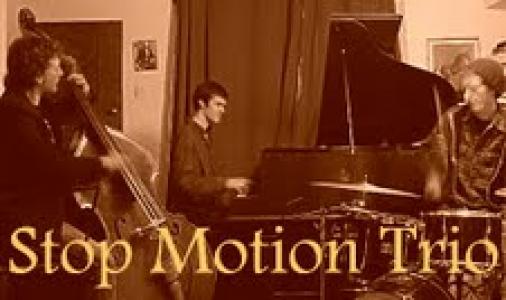
I have always loved music and remember thinking as a concerned 8 year old that we would run out of tunes someday, as there are only a limited number of notes and instruments. Stop Motion Trio re-confirmed that this is not going to happen any time soon as the young trio presented one and a half hours of inventive, moody, and melodic jazz.
The wonder of live jazz is that melodies, tempo changes and interactions happen between the trio through nod of a head, the look in an eye, the shrug of a shoulder.
Stop Motion Trio - Emlyn Vaughan (bass); Matt Davies (Drums) and Aron Kyne gel beautifully and create a well balanced sound, with intricate, though not overdone, solos and an intuitive interaction.
Emlyn Vaughan hugged the bear of a bass, with a tailpiece made from a dinosaur's forearm and played intricate solos; Matt Davies produced some snapping and inventive drum work and Aron Kyne played genius, melodic, fresh, smooth keyboards.
They played a selection of original tunes and standards including a gorgeous version of Summertime and the set was appreciated by the healthy, knowledgeable Arts Theatre audience.
Tragically, I am not a Jazz expert, though I do have some significant historic credentials in seeing (ahem) Freddie Hubbard and Buddy Rich in Middlesbrough's old football stadium, Ayresome Park in the late 1970s.
However, I do hope that I convey some of the Stop Motion Trio experience and urge you to see it first hand.
You can catch Stop Motion Trio, next week, 17th July at the Manchester Jazz Festival.
Paul Harrison
11th July 2012
SUMMER CONCERT - Manchester Recorder Orchestra
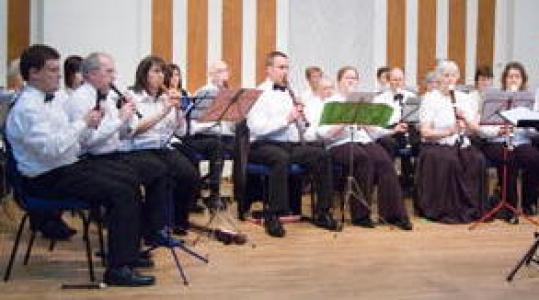
Having once upon a time played in a guitar orchestra, I was familiar with the difficulties of merging similar instruments in an orchestral setting - not least the limited range of tones and pitches which are available to work with. I needn't have been concerned however as, taking in the first few minutes of the concert, I realised there were no less than seven types of recorder on stage, from the tiny, high-pitched sopranino which soared above the orchestra to the deep, deep contra bass which rumbled away in the depths.
Conductors Ian Chesters and David Walsh took the orchestra through a wide-ranging programme, from pieces specifically written for recorder orchestras such as Touchin's "Manchester Welcome" through to the moving Schubert symphony with which they finished the concert. Throughout, the orchestra worked tightly together, most noticeable in the staccato section of the first movement of Marshall's "Triple Concerto".
This year the Manchester Recorder Orchestra brought with them the recorder trio pOLyPhoNiCA (get the capitals in the right place!) who added another dimension to the concert. During the first half they demonstrated the role of the recorder within an orchestral setting, working as soloists during the Marshall Triple Concerto, but then contrasting this with an encore which showed them working as a trio - and an extremely talented trio at that.
Some regular attenders commented that, whilst it was lovely to hear pOLyPhoNiCA, this gave less opportunity than usual to hear individual members of the orchestra. Personally I was fascinated by different recorders and would have appreciated the chance to hear the principal of each section of the orchestra demonstrate the range of his or her instrument. However, within just one short concert it's never possible to fit everything in!
All in all, a fascinating evening which opened my eyes (and ears) to this often overlooked instrument. The range of instruments, tones and techniques went far beyond my expectations and it was a pleasure to witness a group working together so closely and with such evident enjoyment. The pleasure of the evening was enhanced by the friendly, welcoming and informative style of conductors Ian Chesters and David Walsh and the complimentary refreshments at the interval which gave the evening a real social feel. I sensed there were many "regulars" in the audience, and I look forward to joining them in 2013.
Stephanie Watts
SUMMER RESIDENTIAL COURSE CONCERT - Derbyshire City and County Youth Orchestra
When one has the pick of the best young orchestral musicians in Derby and Derbyshire you come to expect a really good orchestra and concert and tonight the audience got just that. When one has a conductor with the communication skills and consummate musicianship of Peter Stark then one knows they are in excellent hands. Tonight's programme was undoubtedly a challenge for any orchestra but for young players it was on the face of it a mountain to climb - but climb it and reach the summit they did with style and command of the music.
The 1st half, albeit short, was a performance of Sir Malcolm Arnold's Ballet Suite "Homage to the Queen", and contains all the familiar Arnold quirks, but is also very firmly lodged in his symphonic output rather than the lighter orchestral concert music. Written for performance in the Coronation year it was first performed at the Royal Opera House on June 2nd 1953. It was revised and revived to celebrate the Queens 80th birthday in 2006, the year Arnold died! This is no easy work to bring off and changes of mood and colour are swift and frequent, a tribute to the players that they could handle this so well. Some intonation difficulties soon settled as the work progressed. I could hear moments of "Padstowe Lifeboat", "Peterloo" and the 5th symphony in this interesting and involving work, with plenty for everyone to do.
After the interval came the real challenge, Richard Strauss "4 Last Songs", with soprano soloist Rachel Chapman who sang with presence and control and helped to raise the players game. Accompanying in this music is a very tall order, but the orchestra were more than able, and there were moments of beauty and atmosphere that many professional groups sometimes miss. Some fine solos on Horn and Violin were a joy. This meditative work expressing calm acceptance of death is not what one associates with a youth orchestra, but they played with depth and maturity.
The final work "Danzon No 2" by Arturo Marquez woke everyone up and showed what an excellent orchestra this is with some fine solos from many players. It also showed that we have our own "Dude" in the guise of Peter Stark. An excellent evening of fine playing.
Andrew J Hodkinson
SUMMER SONGS IN THE CATHEDRAL OF THE PEAK - Guelph Chamber Choir, Canada
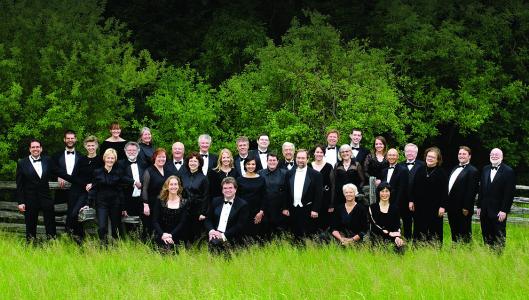
Unfortunately the Fringe reviewer was unable to attend this performance. This review has been kindly contributed by one of the promoters of the event.
Saturday 14 July saw Tideswell as an outreach performance venue for both Buxton Festival and Buxton Festival Fringe. With its wonderful acoustic, it is not surprising that 'The Cathedral of the Peak' is a popular performing space, particularly with choral groups. That acoustic was shown magnificently with a full gamut of choral styles enhanced by use of the organ.
The evening started with a setting of those famous words which open Shakespeare's Twelfth Night 'If music be the food of love' and anticipated an evening of superb music making. Under the title 'Songs of the spirit' we heard the 'Kyrie' from Louis Vierne's Messe Solennelle and the moving 'Prayer for the children' about the loss of childhood in the conflict of war by Kurt Bestor who had been a missionary in the former Yugoslavia. Forming the centre piece of this group was the unaccompanied Te Deum by Canadian composer Leonard Enns. With its opening rhythmic phrase using syllabic repetitions, a contrasting lyrical selection and opportunity for improvisation, it was obvious why this had been a competition set piece for the Llangollen Eisteddfod earlier in the month in which the Guelph Chamber Choir had gained a very credible 3rd place.
We were then treated to three movements from Denis Bédard's 'Suite pour Orgue' on which soloist and choir member Chris Fisher called a 'very fine instrument.'
A group of songs by Canadian composers gave us a flavour of countryside and lifestyle of this vast country travelling from 'Paradise (Song of Georgian Bay)' by route of the intrepid explorers of 'Frobisher Bay' and 'Northwest Passage' to Bytown (now Ottawa) where 'Les Raftsmen', (the loggers) sang of their work, pork and beans, and anticipated a happy return to wives and girlfriends.
Tonight's performers in the Guelph Chamber Choir are a representative ensemble of its larger parent group back home, yet here we found it held two more choirs within, as it divided for ladies upper voices in 'Frobisher Bay' and male voices in 'Northwest Passage'.
It would be interesting to note here that throughout the concert the choir stood in a mixed formation with sopranos and basses mingled on the audiences left with altos and basses on the right. This was not only pleasing visually but also added a richness to the vocal blend.
Now embracing the whole of North America the final group consisted of Spirituals and Gospel songs. However, the appreciative audience would not let these ambassadors of the world-wide singing community leave without an encore, and what could be more fitting than to hear Rob Jeffer's setting of the pre-World War I memories of Fred Mitchells 'I have had singing' and we, the audience, certainly had singing in abundance this evening.
Carol Bowns
THE ART OF GUITAR - Edward Billingham Guitar
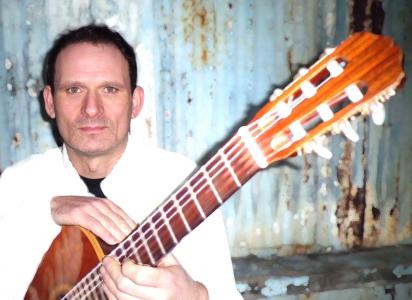
Ed Billingham is not your average classical guitar player - and all the better for it in my view.
On his return to Buxton he mixed some familiar pieces from his - and the guitar - repertoire (such as Albeniz's Asturias) with some newer material. Indeed what was the centrepiece of the concert was Ed's first public performance of a transcription of a keyboard partita of Handel's by David Russell. By his own admission this major and very challenging piece still needs some more work on it but the sound of the harpsichord was easy to hear at times.
Other pieces included Rodrigo's Fandango, which Ed reckons takes many years of constant practice on scales to develop the necessary fluency to deliver - but having got the technique he is now able to think about performing the piece anew on each occasion.
Ed included renaissance pavanes by Luis Milan, Sor's variations on a Mozart theme from The Magic Flute and several pieces by Barros. An appreciative audience was treated to an encore - Villa Lobos's Prelude 4 dedicated by the composer to the indigenous people of Brazil. Ed chose to rededicate the piece in the light of recent news that a dam project in Brazil will lead to the loss of more rainforest and the relocation of thousands of settled people.
So what else sets Ed Billingham aside? Well, how often have you seen a guitarist rub down a rough fingernail with sandpaper mid-concert? What other guitarist having got a buzz from a public performance would spend the next day out cycling 100 miles through the Peak District with his local club?
None of this is to suggest that he does not take his music seriously - clearly he is a dedicated musician - but he is grounded and this brings a warmth and humanity to his playing. It is to be hoped that he becomes very much a regular on the Buxton Fringe scene. The Burbage Institute has a good acoustic for the guitar and provides a good venue away from the bustle of the town centre.
Keith Savage
THE BARTERED BRIDE - City of Manchester Opera
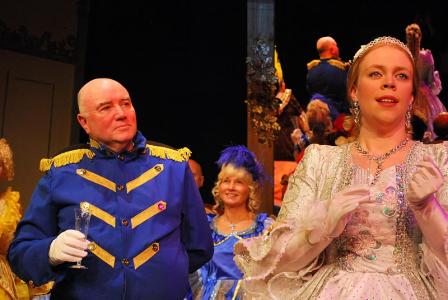
City of Manchester Opera have become a regular feature in the Fringe programme and it was good to see them back again this year with their engaging conductor Juan Ortuno and brilliant accompanist Julian Ellis. They gave us highlights from Smetana's The Bartered Bride.
Although that opera has quite a large number of principal roles COMO have so many fine voices that they had no problem casting even if it did mean that the conductor took the part of Kecal, the marriage broker. There was a lot of very memorable singing particularly from the lovers John Elliott as Jenik and Margaret Ferguson as Marenka and from Eric Cymbir as Vasek. COMO obviously enjoyed singing this work and that was readily communicated to an appreciative audience.
After the interval COMO gave us some operatic excerpts which arguably had some vague connection to the Olympic games. So we had a chorus from Verdi's Don Carlos which might have a link to the Olympic flame and the lovely quartet from Britten's Midsummer Night's Dream which is set in Athens a city associated with the ancient games . This was followed by a sparkling extract from Offenbach's The tales of Hoffman with some beautiful bel canto singing from Joan Dean as the doll Olympia.
The programme ended with a rousing passage from La Rondine by Puccini with Lucy Lee giving a wonderfully romantic performance of the aria Chi il bel sogno di Doretta.
For an encore COMO sang The Kings of Greece from La Belle Helene. It is Offenbach at his best. And it was COMO at their best too!
Peter Low. .
THE DERBYSHIRE SUITE - JET Collective

We don't get much jazz on the Fringe and to have an original suite, expertly played was a very welcome addition to the programme.
The Jet Collective came about almost by accident last year and the line-up isn't conventional: two saxes, electric guitar, bass, drums and three keyboards (plus miscellaneous shakers, recorder and, delightfully, melodica). This combination must have presented challenges when it came to composition and the option of a trumpet, perhaps, might have been welcome at times.
The Suite comprises 13 pieces - all prompted in some way by the experience of being in Derbyshire. Some are relatively obvious in terms of inspiration. The opening 'Storm over Derbyshire' by pianist Paul Biggins - with a rolling and rumbling McCoy Tyner-like figure - was especially appropriate for this year. Other movements needed more explaining. The finale - 'Shaw Croft' - takes its name from the site of the Ashbourne Shrove Tuesday 'football' match and one saxophone represented the 'Ups' while the other took the part of the 'Downs'.
The music drew on a wide range of forms for inspiration. So, for example, the Castleton carol 'Down in yon forest' provided a simple but charming starting point for one piece. Jigs and morris dance tunes also found their way into the suite. For me the highlights included the bluesy 'Back Home', which featured Sara Littlefield's tenor sax and the bossa nova 'Summer Peaks' - written by Wendy Kirkland. (Incidentally it was a pleasure to hear a jazz outfit in which women took such a central role).
By calling themselves a Collective this group seems to eschew leaders and everyone had a chance to shine either instrumentally or as a composer. Pat Sprakes' bass sounded strong and purposeful all night and Clive Loveday's drumming was subtle and sensitive. Karen Clegg provided some lovely vocal touches - as well as recorder and melodica solos. Steve Salfied - on tenor and soprano - shared the saxophone duties as well as contributing the boldest composition 'Mills & hills, mines & moors.'
Reg Clegg's guitar was thoughtful throughout - and his work in producing the CD of the Suite is excellent. The last member of the Collective - but certainly not the least - is pianist Paul Biggins whose strong compositional sense was also evident in his improvisation.
The Collective had to wrestle with the acoustic of the Church at times - piano recitals have sounded very good here but the amplified jazz was a little muddy at times (not, I think, a musical metaphor).
If you missed the JET Collective in Buxton you can remedy that by hearing them on August 2nd at Club Chesterfield - www.chesterfieldjazz.com - or buy their music at www.jetcollective.org
Keith Savage
THE FAMILY MACCOOL - Stratford Festival of Salon Arts
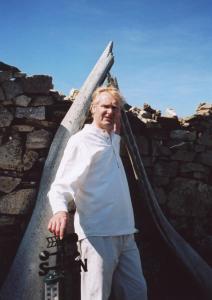
Molly and Jim are what the Fringe is about. They are enthusiastic about music and they got up on stage and shared some of their favourite songs with strangers. It gave us a snapshot of a work in progress. They even gave us a song about Deep Space 9 (a spin-off Star Trek franchise if you aren't a Trekkie). They were nervous but happy and the audience liked them. Pure Fringe.
Ian Parker Heath
THE NIGHTINGALE OF SOUTH BANK - Relative Pitch Opera
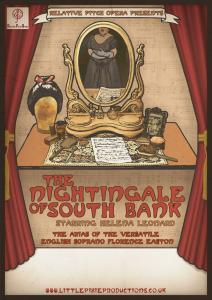
An interesting idea. Instead of a recital with a programme of songs Relative Pitch Opera have put together a short biography of the English singer Florence Easton which included arias that she had sung during her long career. The role of Florence is played by Helena Leonard who has a powerful soprano voice.
Florence must have been a remarkable singer judging from the range of operatic arias that Helena sang. Opening with a formidable piece, "Dich Teure Halle" from Tannhauser ( the first time that we have had Wagner on the Fringe) Helena went on to sing arias from at least eight different operas while donning a range of different garments appropriate to the role she was singing.
Relative Pitch had also managed to create a very pleasant performance space in the somewhat stark atmosphere of the Methodist church hall, by clever use of lighting and a few judiciously arranged props. They had also managed to unearth a wonderful old recording of Florence singing Ave Maria with evocative orchestral portamento.
The one thing Relative Pitch did not have was an orchestra, or indeed any accompaniment. Helena sang to recorded music with the singer having to adjust to the accompaniment rather than the other way round as is usually the case. That she gave such a successful performance suggests that she must have put in a great deal of rehearsal. Could this be the way for more opera to be brought to the Fringe in the future?
Peter Low
There is one more performance on 20 July at 7.00pm at the Methodist Church Hall.
THE WIT AND WISDOM OF THE WILLIAMS BOYS - The Williams Boys
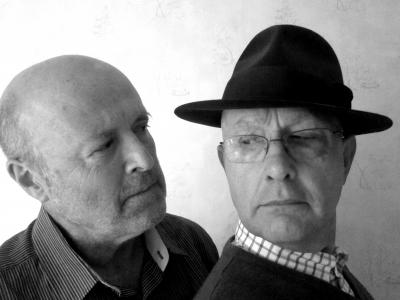
The rain was torrential as I arrived at 'The Source' cafeteria but I received a warm and informal welcome. I purchased a coffee and sat at my table.
Jim and Alan Williams (not related) are the Wit and Wisdom, respectively in the title of this event, although, each provided much of both in their readings and song lyrics. A combination of spoken word, humour and light fingered keyboard jazz.
The evening began with a witty song written by Alan, sung as a duet, 'Who's on First'. Not the Abbott and Costello sketch, although this is acknowledged in the lyrics.
And so Jim was 'on first'. In a pink shirt, with coloured braces and doffing a trilby, he opened his series of seven readings explaining that his theme for the evening was the importance of everyone to write their autobiography. Written, not for public consummation but written for their grandchildren, in order to pass on thoughts and images from past times.
His first reading was an example of the sort of things one should include. This essay was called 'Nelly', Jim's grandmother.
Each of Jim's readings was followed by a related song, sung by Alan, mostly to familiar tunes with Alan's own, often hysterically funny, lyrics.
The combination of anecdotal stories (including a poem by Clive James) from Jim and the music of Alan made for a thoroughly enjoyable evening. I found myself wanting to applaud some of the lyrics before the song had finished; often laughing out loud, so clever and witty were they.
The music was predominantly lively Jazz with excursions to Peter Skellern, Tom Paxton, Burt Bacharach ('Only, 24 minutes from Disley').
I enjoyed so much of the stories and songs many of which I can't explain without giving away the surprises within the stories of the readings and the lyrics of the songs. A side splitting Franglais song; The Midday Vampires of Bergerac (reading); Tom Lehrer's 'The Masochism Tango' and you won't believe how many words there are which rhyme with Bruce and we laughed as we heard each one.
Unfortunately they have no more performances in this years Fringe. I do hope they come back next year, perhaps at a bigger venue.
This was a real treat from two very talented men who combine their skills to produce a fulfilling hour of top class entertainment! They should have their own weekly half hour TV series. They should have an appreciative audience; they certainly did this evening.
Martin Wood
TIDESWELL MALE VOICE CHOIR IN CONCERT - Tideswell Male Voice Choir
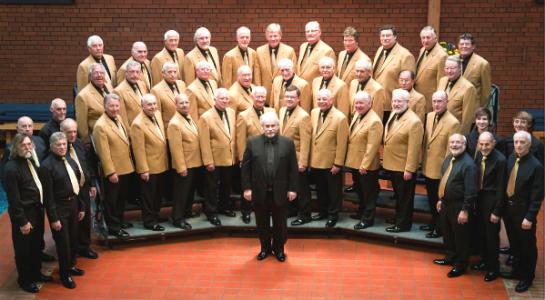
You know the event you are reviewing is likely to be good when you have to queue for a few minutes to get in! Last night was such an event, and was well supported by a capacity audience. When a performance appears easy and relaxed then it usually follows that the performers have worked really hard, and the audience is in for a treat - and we were treated to a slick and professional evening of music.
I would like to give more detail of the music performed but sadly with no printed programme and little verbal information I would likely as not get it wrong. Dennis Kay & Christopher Ellis, the MD and Accompanist, did a wonderful job encouraging and supporting the singers (I had to ask how their names were spelled - no programme!). What a fine ensemble and sound from this men's choir; and their intonation was pretty near faultless even in "Wonderful World", and "Yesterday" where falling phrases can so often arrive flat - not with TMVC. They have a range of sounds and dynamics that makes it a pleasure to hear.
Their guest group was a ladies choir from Altrincham called "Di Voce" (I hope that is correct), and their singing was a revelation - clear, wide range, superb intonation, and dynamic range, and what power from only 27 singers! Their items were wide ranging and a joy to listen to, and the combined items with TMVC were something really special.
The high points for me were "Bohemian Rhapsody", and the solo spot "Floral Dance" with soloist???. For "Di Voce" it was the the Rutter "For the Beauty of the Earth", and Gershwin's "I Got Rhythm". As Dennis said at the end of the concert, a choir is nothing without a first class accompanist and we had two stars last night.
Andrew Hodkinson
TO SLEEP, PERCHANCE TO DREAM - Angela Rowley
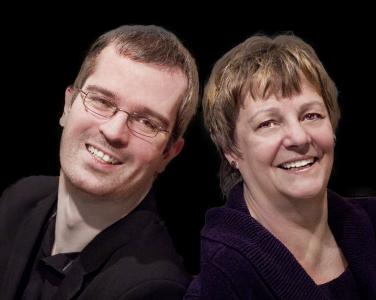
This delightful programme of varied songs around the theme of sleep and all its meanings was beautifully introduced by Angela who drew the audience in to her world from the very beginning with a superb introduction explaining the programme and the choice of music. There was a printed programme which included translations of the German and French songs.
This venue suited the recital so well with an acoustic so right for recitals. The use of this room meant that the pianist had the use of what in my opinion is one of the best pianos in Buxton - deep and rich without being too loud or brash.
Angela has a beautiful soprano voice with light and shade and an expressive face which communicates the music to the audience so well. If I have a slight criticism it is to do with the pitch of some of the singer's phrases, but the command of her material and vocal range almost made we wonder if the piano was playing sharp! She is accompanied by a pianist of musicianship and sympathy and the pair complement each other perfectly - a joy to listen to.
Exactly half the songs were English and for my taste Angela's voice brought to them a freshness but feeling of experience that enhanced every note. My personal favourites were the Frank Bridge, and the Roger Quilter songs. Britten's 'Nocturne' was wonderfully dark in the right way. This was the first Fringe event I had managed to attend and what a pleasure it was. Considering the foul weather an audience of 19 was really splendid.
Andrew Hodkinson
WILEY WAYS ALBUM LAUNCH - Hat Fitz & Cara
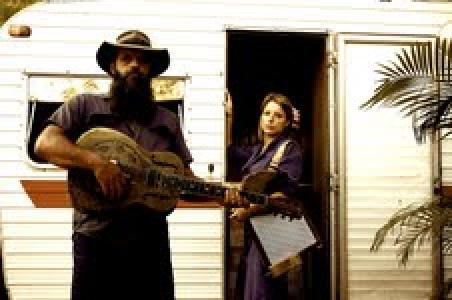
The message here must be simple - hear Hat Fitz and Cara as soon as you can. They will be all over the radio and your TV screens soon and you'll regret not having seen them close up and personal for £7 in Buxton.
Physically they make for an intriguing combination. Hat Fitz seems too big to be contained by the vaulted Barrel Room and with his long thick beard you might suppose he'd just come from a hard day shearing sheep (for he is Australian). Cara is petite and beautiful and dresses with a hint of the femme fatale. (Their first album was called 'Beauty and the Beast'). He plays a variety of guitars - no tender stroking but always deliberate and meaningful. She brings melody via flute and whistle but more strikingly some killer washboard whilst perched behind a drum kit.
More than once Fitz makes the point that the old-time country blues that informs much of his own music-making is not especially popular - never was, never will be. There were plenty of examples in the set that illustrated what it is that he likes - Sleepy John Estes' 'Broke 'n' Hungry' for example.
Fitz met Cara in Ireland whilst on a trip to the 'homeland' - his family was transported nearly 200 years ago. Cara brings elements of Irish traditional music to the sound.
Vocally there is a stark contrast between Fitz's deep, big voice and Cara's purer, cleaner style - but in the finale 'Power' she shows that she can holler with the best of them.
Hat Fitz and Cara are a rare combination of confident, powerful, direct music making that recognises that the things that matter in life are not that complicated, but attaining them is difficult.
For what is advertised as a new album launch they didn't play that much from 'Wiley Ways' - which is all original compositions. There are about halfway through an extensive tour of Europe; they play in Leeds (July 27), Manchester (August 4), Sheffield (August 19). Do yourself a favour and make the effort.
www.hatfitzcara.net
Keith Savage
WILL HAWTHORNE'S KILLER BEES - Will Hawthorne
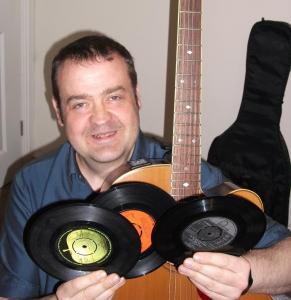
You have to be of a certain age. An age from which can one recall 'the war' to one which one knows what an audio cassette is. The age of the vinyl record. Will Hawthorne's simple idea is this - what was on the 'B' side of was overlooked, sometimes erroneously. He has explored his collection and bought to us some gems and surprises.
Will has struck the right note. His spot on the bandstand was well liked by the crowd, and his show in the Barrel Room was fully appreciated by the audience, who were of course 'of a certain age'. Toes were a-tapping and choruses were joined in as Will gave loving renditions of some of his favourite 'B's from Buddy Holly to The Smiths. I must admit that 3 tunes were new to me, but I think most of the audience knew most of the songs. Proof if proof were needed, that a good song can make an impact with the need of extensive and expensive digital tinkering. Just take one man and his guitar.
Get along to his next shows here on the Fringe.
Ian Parker Heath
WRAGGED TREE - Perry Huntsman & Hilary Morel
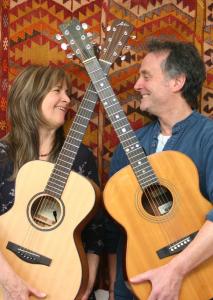
Hilary Morel and Perry Huntsman returned to the fringe again this year under the label of "Wragged Tree" with a different selection of songs and joined for a couple of numbers by Andrew Robinson (photographer and film maker).
They began with a favourite musician of mine, Nick Drake and in addition to performing some of their own compositions they sang a range of folk, Ralph McTell, Sandy Denny (including the a cappella 'The Quiet Joys of Brotherhood'), JJ Cale and Gillian Welch.
The mood was family like (apart from one naughty word in the lyrics), lulling, laid back folk tunes that pleased.
The centre piece for me was their own composition 'Buzzard' which is one of the tracks of the soon to be released Buxton Club Acoustics CD.
If you are a lover of 60's/70s folk, you can catch them again on 20th and 21st in underground venues.
Martin Wood